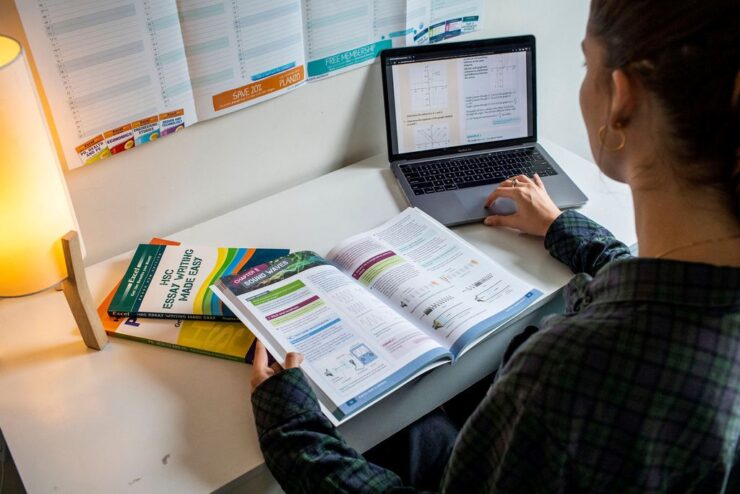Exams have long been regarded as pivotal milestones in one’s academic journey. The stakes are high, as they serve as measuring sticks for our knowledge, skills, and understanding of the subjects we’ve spent countless hours studying. Excelling in exams isn’t just about earning top grades; it’s a testament to our dedication, perseverance, and commitment to learning. In this comprehensive guide, we’ll explore a myriad of strategies and techniques to help you conquer any exam with confidence and finesse. From understanding different exam types to creating effective study plans and adopting smart study habits, this guide is your roadmap to achieving academic success.
Understanding Your Exam

Before embarking on your journey toward exam excellence, it’s crucial to comprehend the unique landscape of the exam you’re facing. Exams come in diverse formats – multiple-choice, essay-based, practical assessments – each demanding a distinct approach. Take the time to review the exam format, structure, and time constraints. Understanding what’s expected of you empowers you to tailor your preparation effectively. Whether it’s mastering essay structuring or practicing problem-solving techniques, decoding your exam’s requirements is your first step toward acing it.
Creating a Study Plan
Time management and organization are the cornerstones of effective exam preparation. Crafting a personalized study schedule aligns your commitments and study time seamlessly. Consider your existing obligations – classes, work, family – and allocate dedicated study slots. Remember, balance is key; avoid cramming, and spread your study sessions over a reasonable timeframe. Prioritize topics based on your strengths and weaknesses, allowing you to delve deeper into challenging areas while revisiting familiar ones. Also, don’t be afraid to use outside help in the form of Gizmo and similar outlets.
Setting Clear Goals

Every study session should be guided by specific, measurable goals. These goals function as a compass, directing your focus and motivation. Instead of generic objectives like “study for chemistry,” strive for “understand the concept of chemical reactions and solve practice problems.” Clear goals foster a sense of achievement and progress, as you tick off each accomplished task. Regularly assess your goals’ effectiveness and adapt them as you progress.
Effective Note-Taking
Taking notes isn’t just a passive activity; it’s a dynamic process that enhances your engagement with the material. Explore different note-taking techniques – the structured outline, the organized Cornell method, and the creative mind mapping – to find what resonates with your learning style. During lectures, practice active listening, capturing key points and main ideas. Afterward, summarize your notes, reinforcing your understanding and retention.
Active Learning Strategies

Passive studying often yields passive results. Active learning, on the other hand, is a game-changer. Instead of merely reading and highlighting, engage with the content. Summarize chapters in your own words, quiz yourself on key concepts, and even teach them to a friend – the best way to learn is to teach. Embrace interactive methods, like group discussions and online quizzes, to deepen your understanding through diverse perspectives.
Smart Study Materials
Navigating the sea of study materials can be daunting. Start with your core resources – textbooks, lecture notes – and supplement them with reputable online sources. Practice exams and study guides offer valuable insights into the exam’s structure and question types. When evaluating resources, prioritize relevance and credibility. Discard irrelevant information and focus on materials that align with your exam’s requirements.
Effective Study Environment

Your study environment plays a pivotal role in shaping your ability to concentrate and work efficiently. Choose a quiet and inviting space that is well-lit, allowing you to focus without strain. By silencing notifications and distancing yourself from potential interruptions, you create a sanctuary of concentration. Elevate the ambiance by incorporating motivational quotes or introducing plants that breathe life into your surroundings. The impact of a well-organized and clutter-free environment cannot be underestimated – it serves as the canvas for your learning journey.
Utilizing Memory Techniques
Unlocking the potential of your memory is akin to unlocking the door to successful studying. Memory-boosting techniques, such as spaced repetition, create a rhythm of revisiting material at intervals that progressively increase. This strategy cements your understanding and recall. Mnemonics and visualization techniques serve as keys to unlocking complex concepts, making them more accessible during crucial moments. As you traverse your study path, integrate memory exercises like reciting key information before bedtime – this ritual embeds essential knowledge into the fabric of your long-term memory.
Healthy Study Habits

Your body and mind are intrinsically linked, and fostering a harmonious relationship between the two is essential for cognitive excellence. Prioritizing sleep is paramount, as 7-9 hours of rest nightly is the foundation upon which memories are solidified and problem-solving capabilities are honed. Engaging in regular physical activity pumps vitality into your brain through enhanced blood flow, revitalizing your cognitive prowess.
Fueling your body with brain-nourishing foods, such as omega-3-rich fish and antioxidant-packed berries, provides the energy and nutrients your mind craves. In the pursuit of maintaining equilibrium, stress management becomes pivotal – practices like meditation, deep breathing, or engaging in rejuvenating hobbies offer the balm that soothes your mental landscape.
Practice, Practice, Practice
Consistency in practice lays the groundwork for exam triumph. Repetition serves as the whetstone that sharpens your skills and reinforces your confidence. Incorporating mock exams into your routine allows you to immerse yourself in a simulated exam environment, acclimatizing to the pressure that comes with the real thing. Time yourself as you delve into practice exams, cultivating familiarity with the time constraints that often accompany exams.
In the aftermath of these mock trials, scrutinize your errors – each misstep is an opportunity for growth. Embrace these missteps as the stepping stones on your path to improvement. Through this iterative process, misconceptions are clarified, and your strategic approach evolves, inching you closer to the pinnacle of mastery.
Test-Taking Strategies

On exam day, managing anxiety is essential. Implement relaxation techniques – deep breathing, visualization – to keep nerves in check. Tackle different question types strategically, allocating time based on each question’s weight and complexity. After answering, review and proofread your work, rectifying errors or adding overlooked details.
Conclusion
In the grand tapestry of education, exams are threads that showcase your learning journey. By employing the strategies outlined in this guide, you’re equipping yourself with an arsenal of tools to navigate these challenges with confidence. Remember, exam excellence isn’t solely about memorization; it’s about embracing a growth mindset, constantly adapting, and seeking improvement.
As you embark on this journey, apply the insights, experiment with different techniques, and find the strategies that resonate with your unique learning style. With preparation, dedication, and a belief in your own potential, you’re not just studying – you’re sculpting a path to academic brilliance. Go forth, study smart, and ace big!

